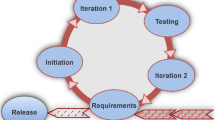Abstract
Global informatization brings potential threats. It is possible to reduce them if software developers are aware of those threats and if customers insist on eliminating them. The survey described in the paper shows that future programmers are aware of numerous threats associated with global informatization. Many threats may be reduced by users’ involvement in the software process. Software developers should learn and develop cooperation with users, as emphasized in agile methodologies. It is a task for academic teachers to promote collaboration between software authors and users, to show how to organize it, and to convince programmers that it is valuable. Users’ involvement requires changes in the software life cycle and in the set of established processes. Such changes, in the form of additionally established processes and phases in the software development cycle, are identified in the paper. One recommended process is the software product assessment intended to elicit feedback from users. Users’ involvement may help to respect ethical and social values and to produce software adapted to user expectations.


Similar content being viewed by others
References
Agile_FDD. (2004). Agile software development using Feature Driven Development (FDD), (1993–2004), Nebulon Pty. LTD., http://www.nebulon.com.fdd.
Ambler, S. W. (2005). Phases examined: why requirements, analysis, and design no longer make sense, http://www.agilemodeling.com/essays/phasesExamined.htm.
Ambler, S. W. (2006). Agile Model Driven Development (AMDD), http://www.agilemodeling.com.
Beck, K. (2000). Extreme programming. Boston: Addison-Wesley.
Begier, B. (2002). Evaluating software quality to regard public interest. In: Proceedings of the Sixth International Conference “The Transformation of Organisations in the Information Age: Social and Ethical Implications” ETHICOMP 2002 (pp. 39–52). Lisbon.
Begier, B. (2005). The UID approach—the balance between hard and soft methodologies. In K. Zielinski & T. Szmuc (Eds.), Software engineering: Evolution and emerging technologies (pp. 15–26). Amsterdam: IOS.
Begier, B. (2007). Software quality improvement by users’ involvement in the software process (in Polish), ISSN 0551–6528. Poznan (Poland): Publishing House of PUT.
Begier, B., & Wdowicki, J. (2006). Feedback from users on a software product to improve its quality in engineering applications. In K. Sacha (Ed.), IFIP volume 227. Software engineering techniques: Design for quality (pp. 167–178). Boston: Springer Verlag.
Biffl, S., Aurum, A., Boehm, B., Erdogmus, H., & Grünbacher, P. (Eds.) (2006). Value-based software engineering. Berlin: Springer Verlag.
Boehm, B., & Turner, R. (2004). Balancing agility and discipline. A guide for the perplexed. Boston: Addison-Wesley.
Cockburn, A. (2005). Crystal clear. A human-powered methodology for small teams. Upper Saddle River: Addison-Wesley.
Ferre, X., Juristo, N., Moreno, A. M. (2005). Framework for integrating usability practices into the software process. In F. Bomarius & S. Komi-Sirviö (Eds). Product focused software process improvement (pp. 202-215), LNCS 3547. Berlin / Heidelberg: Springer.
Gotterbarn, D. (1999). How the new software engineering code of ethics affects you. IEEE Software, 16(6), 58–64.
Highsmith, J. (2004). Agile project management. Boston: Addison-Wesley.
Huff, Ch, & Martin, D. (1995). Computing consequences: a framework for teaching ethical computing. Communications of the ACM, 38, 75–84.
Iivari, N. (2004). Enculturation of user involvement in software development organizations—an interpretive case study in the product development context. In Proceedings of the third Nordic conference on human-computer interaction (pp. 287–296). Tampere (Finland): ACM (USA).
Kujala, S. (2008). Effective user involvement in product development by improving the analysis of user needs. Behaviour & Information Technology, 27(6), 457–473.
Manifesto for Agile Software Development (co-authors: Beck, K., Cockburn, A., Fowler, M., Highsmith, J., Martin, R. C., et al.) (2001). Agile Alliance, http://agilemanifesto.org.
Martin, R. C., & Martin, M. (2007). Agile principles, patterns, and practices in C#. Indianapolis: Pearson Education and Prentice Hall.
Mattsson, J. (2009). Exploring user-involvement in technology-based service innovation, ICE-Project Working Paper 2009:02, Department of Communication, Business and Information Technologies Roskilde University and Center for Communication, Media and Information Technologies Aalborg University, both in Denmark, http://www.ice-project.dk.
Ritzer, G. (1996). The McDonaldization of society. Thousand Oaks: Pine Forge.
Rogerson, S., & Gotterbarn, D. (1998). The ethics of software project management. In G. Collste (Ed.), Ethics and information technology (pp. 137–154). Delhi: New Academic.
Tabaka, J. (2006). Collaboration explained. Facilitation skills for software project leaders. Upper Saddle River: Addison-Wesley.
The GC Strategy Group. (2003). Building the case for global computing, (v0.99), online at ftp://ftp.cordis.europa.eu/pub/ist/docs/fet/fetgc-32.pdf accessed 16.06.2008.
Turner, R., & Boehm, B. (2003). People factors in software management: lessons from comparing agile and plan-driven methods. Crosstalk: The Journal of Defense Software Engineering, 16(12), 4−8.
Author information
Authors and Affiliations
Corresponding author
Rights and permissions
About this article
Cite this article
Begier, B. Users’ involvement may help respect social and ethical values and improve software quality. Inf Syst Front 12, 389–397 (2010). https://doi.org/10.1007/s10796-009-9202-z
Published:
Issue Date:
DOI: https://doi.org/10.1007/s10796-009-9202-z




